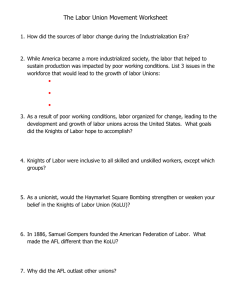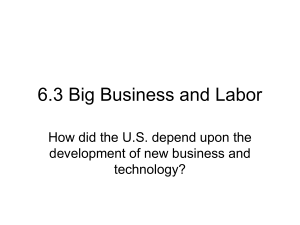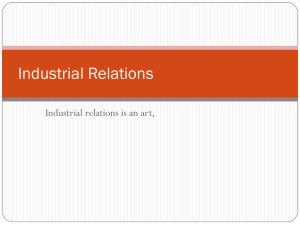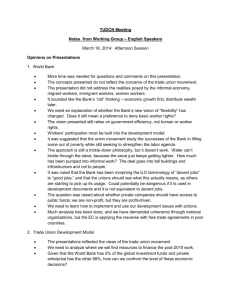TUDCN Manifesto - International Trade Union Confederation
advertisement
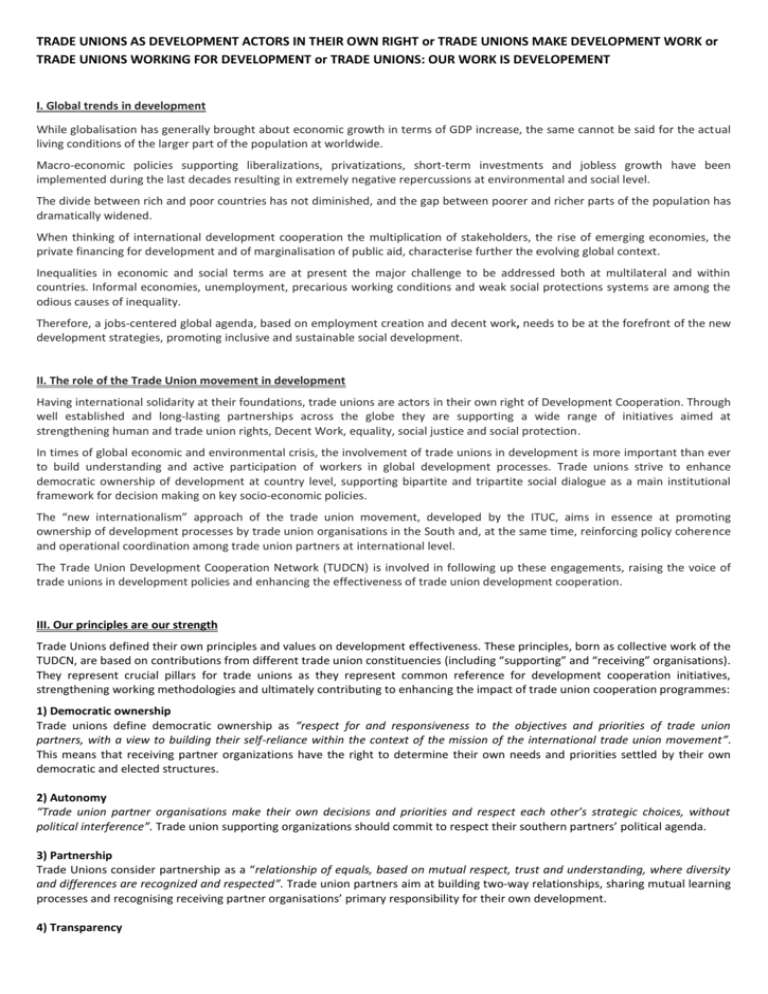
TRADE UNIONS AS DEVELOPMENT ACTORS IN THEIR OWN RIGHT or TRADE UNIONS MAKE DEVELOPMENT WORK or TRADE UNIONS WORKING FOR DEVELOPMENT or TRADE UNIONS: OUR WORK IS DEVELOPEMENT I. Global trends in development While globalisation has generally brought about economic growth in terms of GDP increase, the same cannot be said for the actual living conditions of the larger part of the population at worldwide. Macro-economic policies supporting liberalizations, privatizations, short-term investments and jobless growth have been implemented during the last decades resulting in extremely negative repercussions at environmental and social level. The divide between rich and poor countries has not diminished, and the gap between poorer and richer parts of the population has dramatically widened. When thinking of international development cooperation the multiplication of stakeholders, the rise of emerging economies, the private financing for development and of marginalisation of public aid, characterise further the evolving global context. Inequalities in economic and social terms are at present the major challenge to be addressed both at multilateral and within countries. Informal economies, unemployment, precarious working conditions and weak social protections systems are among the odious causes of inequality. Therefore, a jobs-centered global agenda, based on employment creation and decent work, needs to be at the forefront of the new development strategies, promoting inclusive and sustainable social development. II. The role of the Trade Union movement in development Having international solidarity at their foundations, trade unions are actors in their own right of Development Cooperation. Through well established and long-lasting partnerships across the globe they are supporting a wide range of initiatives aimed at strengthening human and trade union rights, Decent Work, equality, social justice and social protection. In times of global economic and environmental crisis, the involvement of trade unions in development is more important than ever to build understanding and active participation of workers in global development processes. Trade unions strive to enhance democratic ownership of development at country level, supporting bipartite and tripartite social dialogue as a main institutional framework for decision making on key socio-economic policies. The “new internationalism” approach of the trade union movement, developed by the ITUC, aims in essence at promoting ownership of development processes by trade union organisations in the South and, at the same time, reinforcing policy coherence and operational coordination among trade union partners at international level. The Trade Union Development Cooperation Network (TUDCN) is involved in following up these engagements, raising the voice of trade unions in development policies and enhancing the effectiveness of trade union development cooperation. III. Our principles are our strength Trade Unions defined their own principles and values on development effectiveness. These principles, born as collective work of the TUDCN, are based on contributions from different trade union constituencies (including “supporting” and “receiving” organisations). They represent crucial pillars for trade unions as they represent common reference for development cooperation initiatives, strengthening working methodologies and ultimately contributing to enhancing the impact of trade union cooperation programmes: 1) Democratic ownership Trade unions define democratic ownership as “respect for and responsiveness to the objectives and priorities of trade union partners, with a view to building their self-reliance within the context of the mission of the international trade union movement”. This means that receiving partner organizations have the right to determine their own needs and priorities settled by their own democratic and elected structures. 2) Autonomy “Trade union partner organisations make their own decisions and priorities and respect each other’s strategic choices, without political interference”. Trade union supporting organizations should commit to respect their southern partners’ political agenda. 3) Partnership Trade Unions consider partnership as a “relationship of equals, based on mutual respect, trust and understanding, where diversity and differences are recognized and respected”. Trade union partners aim at building two-way relationships, sharing mutual learning processes and recognising receiving partner organisations’ primary responsibility for their own development. 4) Transparency Trade unions define transparency as “high standards of openness and access to information necessary for equitable relations between trade union partners”. It applies to both organisational and financial management, and information sharing on development initiatives. Without this principle, “cooperation efforts can be prone to poor targeting, duplication and also corruption.” 5) Accountability “Trade union partner organisations are liable to a system of mutual accountability at political, operational and financial levels, which should be supported by appropriate common assessment tools and learning processes to gain increased effectiveness in future initiatives (…) First and foremost, trade union partners are responsible to their members for giving account of the actions they have taken”. The most important accountability line is therefore between Trade Union organisations and their affiliates, being membership based. 6) Coherence “Coherence is for trade union organisations the achievement of maximum degree of consistency in approach at all levels among the variety of development cooperation initiatives.” Trade Unions undertake development programmes in support to priorities set by national organisations, and in compliance with regional and global policy orientations. Coherence means also a commitment to coordination in order to avoid duplications and to support, when possible, multilateral development initiatives. 7) Inclusiveness and Equality “The trade union movement believes that inclusiveness and equality means that all workers have the right to equal opportunity of treatment in employment and occupation”. Trade unions commit to target, as part of their development cooperation programs, the most marginal and less represented groups of working people. Trade Unions fight against any discrimination made on the basis of race, sex, gender identity, religion, political opinion, nationality, social origin, age or disability. 8) Sustainability “Trade unions understand sustainability as the long-term viability of development project outcomes, as well as the strengthening of cooperating trade union organisations”. Sustainability comprises self-reliance, ownership, autonomy in political and economic terms and the preservation of the environment for future generations. Trade Unions are engaged in following up these principles, improve the quality of partnerships between donor and receiving organisations, as well as, strengthening the capacity of impact assessment of international trade union cooperation programmes. IV. New global governance: our challenges Trade Unions believe that development is driven by decent work. Increased employment means lifting people out of poverty and the increase of decent work supports sustainable, inclusive human development. A paradigm shift in global development is needed, to include decent work, and social protection as main priorities to be supported. Trade Unions strongly support the inclusion of these objectives as global targets within the new post 2015 framework. Social dialogue is a tool for achieving decent work. Dialogue among social partners - workers and employers organisations - is the basis for working for and ensuring inclusive and sustainable development. Trade Unions want development cooperation policies and practices to be consistent with international human rights principles and standards. The Human Rights based approach (HRBA) is fundamental to the development effectiveness agenda, promoting accountability and boosting reforms towards the realization of social justice, gender equality, and sustainability. Trade Unions are committed in supporting HRBA accountability mechanisms amongst all stakeholders of development cooperation. Trade Unions strongly support Policy Coherence for Development (PCD) entailing consistency of economic policies, such as trade and investment, with development policies aimed at contrasting poverty and inequalities. Trade Unions stand for strengthening institutional mechanisms to ensure implementation and monitoring on policy coherence for sustainable development, thus contributing to a new global governance; Trade Unions insist on the need of a new global governance framework that is based on standards, including the existing human rights standards (including labour and gender), as well as, environmental and development effectiveness standards (Paris, Accra, and Busan principles). The framework must have independent and binding accountability mechanisms keeping development partners to their commitments. Therefore, trade unions will support the strengthening of global institutional mechanisms and structures to ensure implementation and monitoring of sustainable development. Trade Unions support multi-stakeholders policy dialogues involving the participation of Civil Society Organisations (CSOs). Only through the constant commitment amongst different actors such as governments, parliaments, local authorities, civil society, private sectors, trade unions, academia, is possible to get an inclusive and effective development process. This approach allows increasing the overall accountability, as well as, supports democratic ownership of development policies. Private sector actors and their potential contribution to sustainable development, in terms of job creation, improved living wages and transfer of technologies is recognised. However, going beyond the self-interest of companies, private sector players should respect the relevant ILO, UN and OECD regulations. . Transparency and accountability and respect for the principles of development effectiveness, should also be at the heart of private sector engagement in development and priority should be given to the support for local private sector and social economy entities. New forms of cooperation are developing, with emerging economies and middle income countries as protagonist. South-South Cooperation (SSC) processes play an important role in strengthening ties among southern countries and in balancing southern representation in multilateral fora. However, trade unions consider fundamental that SSC objectives and modalities are regulated by the internationally recognised agreements and standards.


